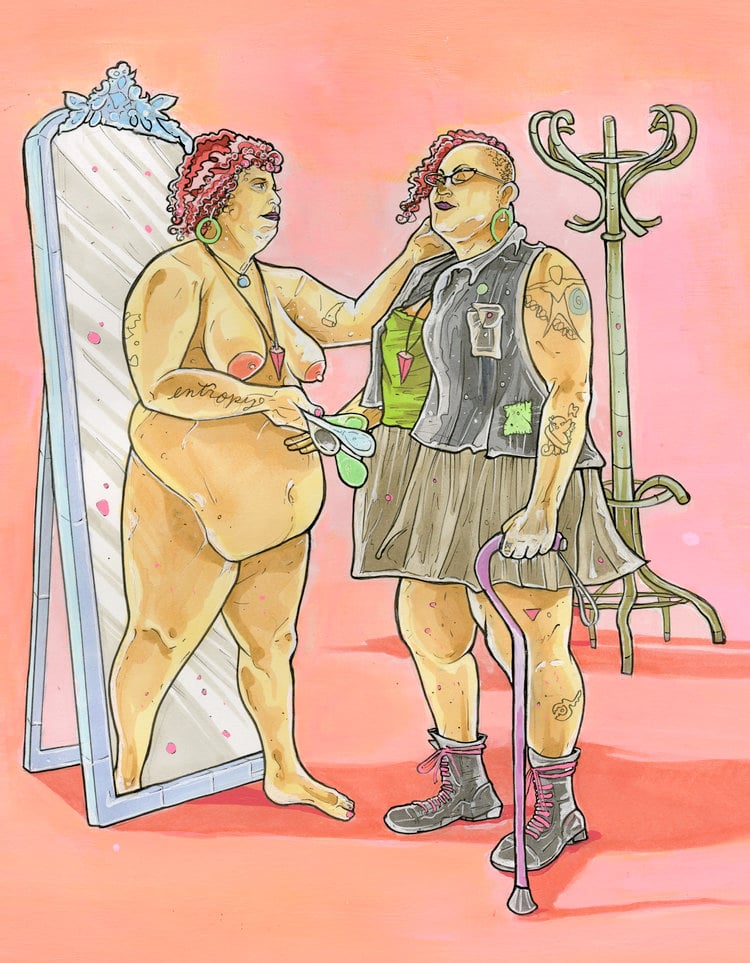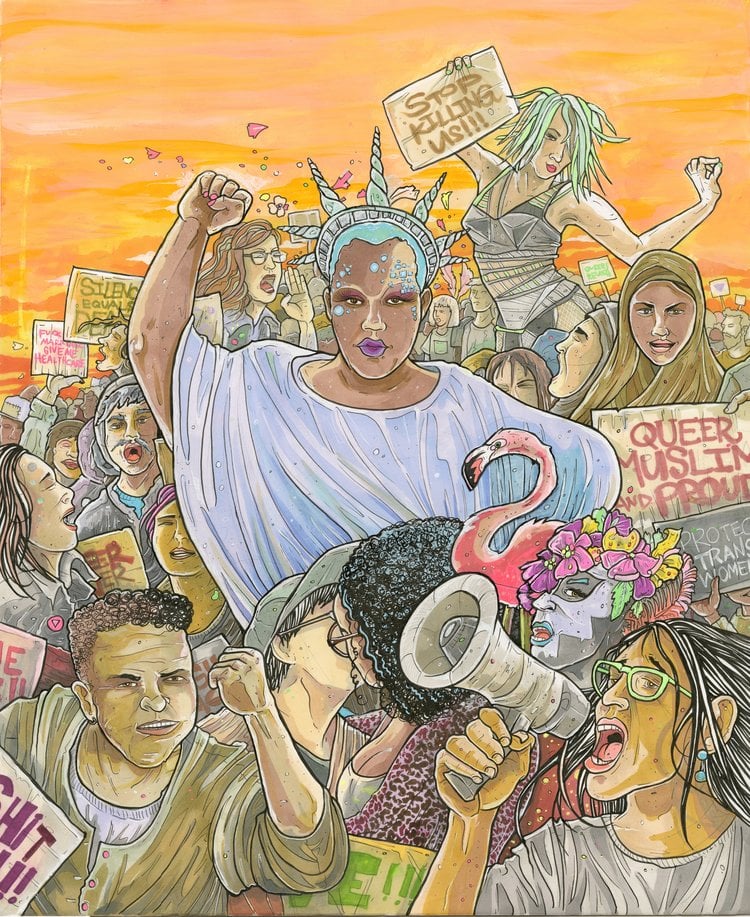I found Cristy Road’s work because a friend had the New World Tarot and unfortunately let me hold it for a while. I could not put it down. They actually had to take it back from me. If you haven’t seen this deck, stop right now and click on this link. Easily one of the most diverse tarot decks I’ve ever seen. Feminist, inclusive and representative of the world around us, Road’s deck is a clear departure from the straight, white tarot that most of us grew up with.
After going down the rabbit hole researching Roads and her work, I grew more and more enchanted with her. Musician, artist, poet, and activist- she lives the punk rock badass existence and shares it with us through so many avenues. We found some time to chat and my crush and admiration embiggened.
Melissa: Your thesis is on the history of tarot! That’s cool as shit.
Cristy: Yeah, I want to do something more with that. I’m not sure what yet. I went to FIT for illustration and wanted more teaching gigs. I found that capitalism was becoming a problem. I realized I’m not going to change my style or the content of my graphic novels and music and the deck to capitalize off it more. I felt like I could get more commission work if I had a more flexible portfolio and developed that. I needed to shift my focus to workshops and lectures. I felt like with an MSA I could get more stable jobs. I’m a Cancer rising and I need this weird life. Being on tour for half the year and then having this grounding thing.
I went [to FIT] for illustration and did a written piece and a visual piece – the tarot deck was the visual piece. I’d been working on it before school and was going to do a Kickstarter eventually. I really liked the concept of creating this deck on a way that was very based off of my magic and reclaiming magic from the dogmatic and weird ways that it’s been presented to me all my life, through Catholicism or even witchy communities that were very white.
I started the deck with Michelle Tea back in 2007, we collaborated on the image ideas, but then we stopped working together. No drama involved. I stayed with the deck, though. I wanted to make it mine. I was very depressed – it was hard to work with the pangs of racism and homophobia. Friendships were hard, and there was so much death at the time. I was trying to stay grounded with yoga – you know, smoke some weed…. Overall, I wanted to make sure I had my communities and my altars and all of these things that assisted with this long-term healing process. My response to all of this was triggered by past trauma with sexual assault and reclaiming my body from these terrible things that happened 15-20 years ago. Healing from that with involved feminism, punk and being a badass bitch. My book Bad Habits is all about that.
At the end of the day, that along with family drama and colonialism – things that affected my family and have made my existence different than the idealized immigrant story that we grow up hearing. Realizing that we were just people. I really needed grounding and I think that’s why I connected to magic. The way it connected to my tarot deck was really amazing. I never considered learning about the tarot – I thought it was cool and I knew about the cards, and how people connected to it. I liked not knowing the history because I was aware of the European commercialization of it. I decided I would really read this and then explain like the Golden Dawn ignored everything that came before it. Egyptian, Chinese, Indian history was just covered up and destroyed. These things did not become commercial, they were just spiritual tools. The commercialization started in the 1500’s in Italy and from that came the first commercial decks. It really pissed me off. This is the history of capitalism.
That’s why I wrote it. I love and respect the pioneers of the mass production of those projects. I just hate the history and the archives. I couldn’t even find the Egyptian history except that Egyptian imagery is used in the cards. The knowledge about the Qabalah that exists in popular decks – people have created decks that are using this information, but where are the roots? The history with the Golden Dawn and the late 1800’s in the decks – the exclusivity that existed there that was put forth by white men. There is so much more that we should all know. This is why I’m editing my thesis for publication – this is all articulated in there. I also talk about politicizing the deck. Even though people still honor the Golden Dawn, there are also decks like the Motherpeace decks. You need the feminist versions as well. I’ve only heard of tarot being taught in an illustration course once. I’m having a moment now- I’m so glad you brought that out.
It was really cool to learn this history, and I found the book “The Secrets of the Tarot” by Barbara Walker. This is an anti-patriarchy, anti-colonialism book and it was amazing. (There is also a feminist tarot deck by Barbara Walker.) She really politicized everything – I’m so glad it was written.
Melissa: It’s frustrating to always see straight white people in tarot.
Cristy: Right, but I don’t think it’s always straight white folks who perpetuate that, though. It’s sad. When you live your life subconsciously seeing only a certain kind of face around you, it’s a lot to deal with. You want to try to represent everyone. The older I get, the more I want to elevated folks who usually aren’t elevated. I paint people I know. I started the deck when I was 29-30, and it was just a lot of queer punks who were my age. Maybe some older folks. There were some people who weren’t included even though they were friends, because they were white or straight – and I thought that they’ve been represented a lot. I definitely engage in white spaces a lot in the punk scene, but when I was younger I didn’t want to go to shows. Now I don’t care – I just want to go see a band I like.
I think that Cristy Roads’ work is important, because people on the margins can see their faces in the tools they use to see their lives. This is a big deal. The next edition of the New World Tarot will be available in November 2018.
Cristy – thanks so much for taking the time!
Find more art by Cristy C. Road here, at Croadcore.com.


